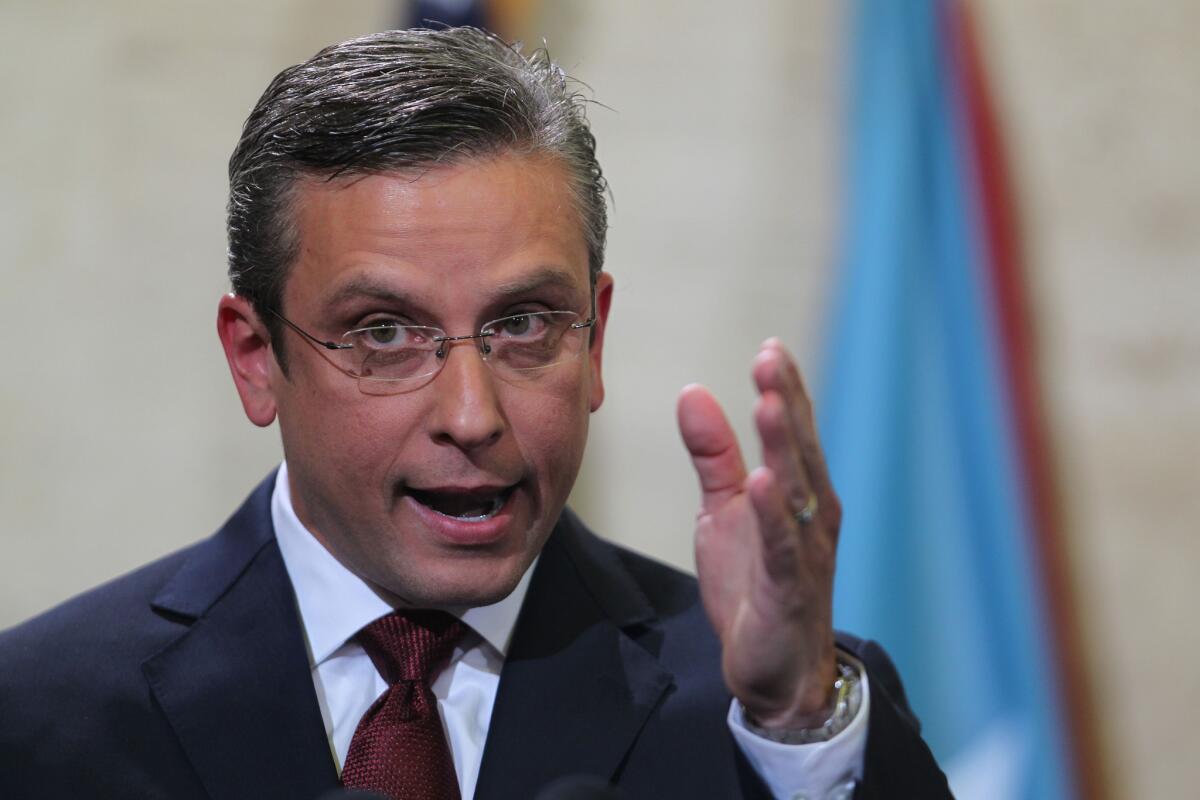Puerto Rico staggers under $72 billion in debt; governor asks for help

Puerto Rico Gov. Alejandro Garcia Padilla in April.
- Share via
Reporting from Mexico City — Staggering under a $72-billion debt, Puerto Rico, a U.S. commonwealth in the Caribbean, says it may not be able to make its payments, a step that would rattle the financial underpinnings of the United States.
“We must all share the payment of this debt,” Puerto Rico Gov. Alejandro Garcia Padilla said in a televised address Monday, in which he called for help. “This isn’t the moment of recrimination…. It is the moment of unity.... It is the moment to act.”
He called on Washington to help save Puerto Rico from an economic downturn that would impoverish its people and possibly spur many to leave the island.
The U.S. government, however, is not planning to rescue Puerto Rico.
“There’s no one in the administration or in D.C. that’s contemplating a federal bailout of Puerto Rico,” White House spokesman Josh Earnest said at his daily news conference.
As a commonwealth, Puerto Rico, technically, cannot default. But it can throw its investors, including many U.S. individuals attracted by what seemed to be safe, high-performing municipal bonds, into a financial tailspin.
To put it in perspective: Puerto Rico’s debt is half that of California’s - with less than a tenth of the population. That’s to say, each resident of Puerto Rico has a $20,000 debt hanging over his or her head, more debt per capita than any state in the United States. Debt equals 70% of the commonwealth’s economic output.
On Monday, an independent team of investigators released a report, commissioned by Puerto Rico, that put the island’s situation in stark relief.
The “current situation is unsustainable,” the report, whose chief author was Anne Krueger, a former World Bank chief economist, said. “The situation is dire.”
High debt, combined with low growth, “outmigration” and financial burdens as part of the United States (such as U.S.-mandated welfare and Social Security costs), all combine to doom the island to possible ruin, the report concluded. Puerto Rico is tied to the U.S. dollar, which means devaluation is not a potential tool.
Garcia Padilla, ahead of his address later Monday, said the report was not surprising but “for the first time acknowledges the true extent of the problem.”
“We must make difficult decision to meet the challenges we now know are ahead and I intend to do everything in my power to lead us through this time,” he said in a statement.
Earlier, he told the New York Times that promoting growth was key to the island’s financial survival but that the debt was “unpayable.”
“My administration is doing everything not to default,” Garcia Padilla told the New York Times. “But we have to make the economy grow. If not, we will be in a death spiral.”
Puerto Rico has suffered from economic mismanagement for decades, analysts say, including deep recession and unemployment that unofficially may approach 20%. U.S. manufacturing disappeared in the 1990s, along with military bases and other sources of income. In contrast to other Caribbean nations, natives of Puerto Rico do not send home the same quantity of remittances, the money that sustains so many people throughout the region.
In Puerto Rico “you have not much economy, not much growth, and no discernible way to pay” the debt, said Corey Boles, a senior analyst for the Eurasia Group who specializes in Puerto Rico. “It’s been a classic case of financial mismanagement … of spending more than they had.”
Those who would be most hurt by Puerto Rico’s inability to make its payments, Boles said, would be U.S. hedge funds and pension companies who are heavily invested in the Puerto Rico market.
Another consequence, he warned, is that if Puerto Rican services no longer function - the garbage isn’t collected and the hospitals shut down - there could be an exodus of Puerto Ricans to the U.S. mainland. Puerto Ricans are U.S. citizens at birth.
Those watching Puerto Rico said the commonwealth cannot benefit from the kinds of bailouts that rescued Detroit and other parts of the U.S. Instead, a major restructuring is the only solution, these analysts said.
“We need more work ... more economic activity ... to pay the debt … for the country to move forward,” Garcia Padilla said. “We have to change the fundamental working of the government.”
Follow @TracyKWilkinson on Twitter for more news from Latin America
More to Read
Sign up for Essential California
The most important California stories and recommendations in your inbox every morning.
You may occasionally receive promotional content from the Los Angeles Times.











